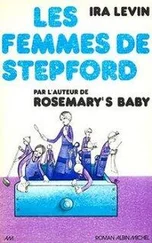Ira Levin
THE BOYS FROM BRAZIL
To
JED LEVIN
NICHOLAS LEVIN
ADAM LEVIN
And the Memory of
CHARLES LEVIN
The author is grateful for information given him by Dr. Maurice F. Goodbody, Jr., Mr. and Mrs. Samuel Halperin, Mr. Anthony Koestler, and Mr. Edmund C. Wall.
EARLY ONE EVENINGin September of 1974 a small twin-engine plane, silver and black, sailed down onto a secondary runway at São Paulo’s Congonhas Airport, and slowing, turned aside and taxied to a hangar where a limousine stood waiting. Three men, one in white, transferred from the plane to the limousine, which drove from Congonhas toward the white skyscrapers of central São Paulo. Some twenty minutes later, on the Avenida Ipiranga, the limousine stopped in front of Sakai, a temple-like Japanese restaurant.
The three men came side by side into Sakai’s large red-lacquered foyer. Two of them, in dark suits, were bulky and aggressive-looking, one blond and the other black-haired. The third man, striding between them, was slimmer and older, in white from hat to shoes except for a lemon-yellow necktie. He swung a fat tan briefcase in a white-gloved hand and whistled a melody, looking about with apparent pleasure.
A kimonoed checkroom girl dipped and smiled prettily, and given the hat of the man in white, tried for his briefcase. He moved from her reach, however, and addressed himself to a lean young Japanese coming at him in a smile and a tuxedo. “My name is Aspiazu,” he announced in Portuguese harshened by a slight German accent. “A private room is reserved for me.” He looked to be in his early sixties and had cropped gray hair, vivid and cheery brown eyes, and a neat gray hairline mustache.
“Ah, Senhor Aspiazu!” the Japanese exclaimed in his own version of Portuguese. “Everything’s ready for your party! Will you come this way, please? Just up these stairs. I’m sure you’ll be happy when you see the arrangements.”
“I’m happy now,” the man in white said, smiling. “It’s a pleasure to be in the city.”
“You live in the country?”
The man in white, following the blond man up the stairs, nodded and sighed. “Yes,” he said drily, “I live in the country.” The black-haired man went after him, and the Japanese went last. “The first door on the right,” he called ahead. “Will you remove your shoes before you go in, please?”
The blond man ducked to peer through an octagonal wall-opening, then braced a hand against a doorpost, raised his foot behind him, and pulled the shoe from it. The man in white put forward a white-shod foot on the hallway’s carpet, and the black-haired man crouched down and unfastened a gold buckle at the side of it. The blond man, having set both his shoes aside, opened an intricately carved door and went into a pale-green room beyond. The Japanese toed himself nimbly out of pumps. “Our best room, Senhor Aspiazu,” he said. “Very nice.”
“I’m sure it is.” The man in white pressed white-gloved fingertips against a doorpost as he watched the removal of his second shoe.
“And our Imperial Dinner for seven, with beer, not saki, and brandy and cigars after.”
The blond man came to the doorway. Small white scars darned his face; one of his ears had no lobe. He nodded and stepped back. The man in white, shorter now by more than normal heel-height, went into the room. The Japanese followed him.
The room was cool and sweet-smelling, a placid oblong silk-walled in the hazy pale green of its tatami floormats. At its center, bamboo backrests with tan-and-white-patterned cushions faced three sides of a low black oblong table set with white plates and cups; three settings and backrests at each of the table’s long sides and one at its right end. A shallow foot-well smaller than the table lay beneath it. At the room’s right end another low black table stood against the wall, two electric burners set into its surface. The wall opposite was shoji screens of black-framed white paper. “Plenty of room for seven,” the Japanese said, gesturing toward the central table. “And our best girls will be serving you. Prettiest too.” He smiled and raised his eyebrows.
The man in white, pointing at the shoji screens, asked, “What’s behind there?”
“Another private room, senhor.”
“Is it being used tonight?”
“It hasn’t been reserved, but a party might want it.”
“I reserve it.” The man in white gestured to the blond man to open the screens.
The Japanese looked at the blond man and at the man in white again. “It’s a room for six,” he said uncertainly. “Sometimes eight.”
“Of course.” The man in white strolled away toward the end of the room. “I’ll pay for eight more dinners.” He bent to study the burners in the table. His fat briefcase moved against his trouser leg.
The blond man was sliding the screens apart; the Japanese hurried to help him, or perhaps to prevent him from damaging the screens. The room beyond proved to be a mirror-image of the first room, except that its ceiling lighting panel was dark and the table beneath it was set for six, two at each side and one at each end. The man in white had turned to look; the Japanese smiled across the room at him uncomfortably. “I’ll only charge you if someone asks for it,” he said, “and then only the difference between what we charge downstairs and what we charge up here.”
The man in white, looking surprised, said, “How nice! Thank you.”
“Excuse me, please,” the black-haired man said to the Japanese. He stood just within the room, his dark suit rumpled, his round swarthy face sheened with sweat. “Is there any way of closing this?” He pointed back toward the octagonal opening in the wall. His Portuguese was Brazil-accented.
“It’s for the girls,” the Japanese explained hopefully. “To see if you’re ready for your next course.”
“That’s all right,” the man in white told the black-haired man. “You’ll be outside.”
The black-haired man said, “I thought maybe he could…” and he shrugged apologetically.
“Everything is satisfactory,” the man in white said to the Japanese. “My guests will arrive at eight o’clock and—”
“I’ll show them up.”
“No need; one of my men will be waiting below. And after we eat we’ll have a conference here.”
“You can stay till three if you like.”
“No need for that either, I hope! An hour should be sufficient. And now would you bring me please a glass of Dubonnet, red, with ice and a twist of lemon peel.”
“Yes, senhor.” The Japanese bowed.
“And is it possible to have more light? I plan to read while I wait.”
“I’m sorry, senhor, this is all there is.”
“I’ll manage. Thank you.”
“Thank you , Senhor Aspiazu.” The Japanese bowed again, bowed less deeply to the blond man, bowed hardly at all to the black-haired man, and went quickly from the room.
The black-haired man closed the door, and facing it, raised his arms high, curved his fingers, and set the tips of them on top of the doorframe as if to play a key board. He moved his hands slowly apart.
The man in white went and stood with his back to the wall-opening while the blond man went to the backrest at the end of the table and crouched beside it. He pressed its tan-and-white cushions and lifted them from the bamboo frame and put them aside. He inspected the frame, turned it over to look at its bottom, and put it aside with the cushions. He felt the tatami matting all around the end of the table; with widespread hands he explored the plaited grass, gently pressing.
Читать дальше











